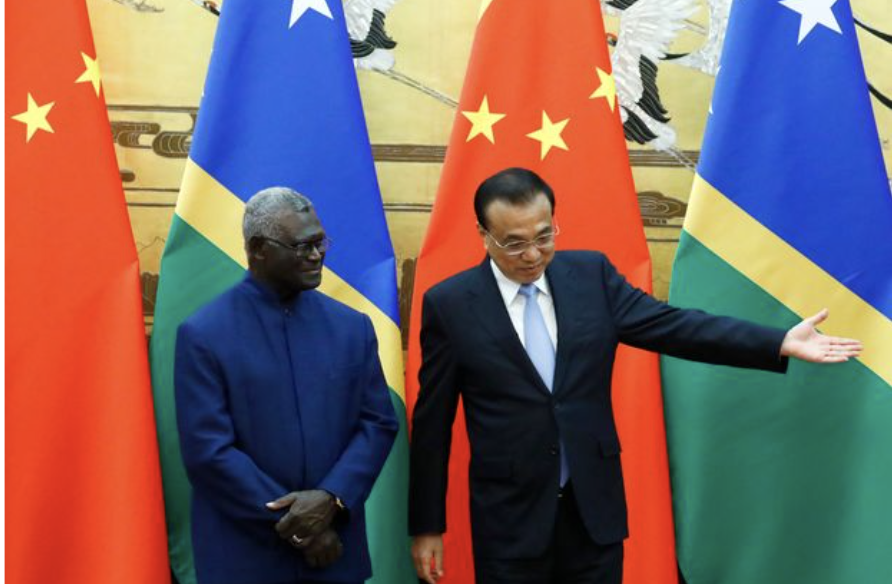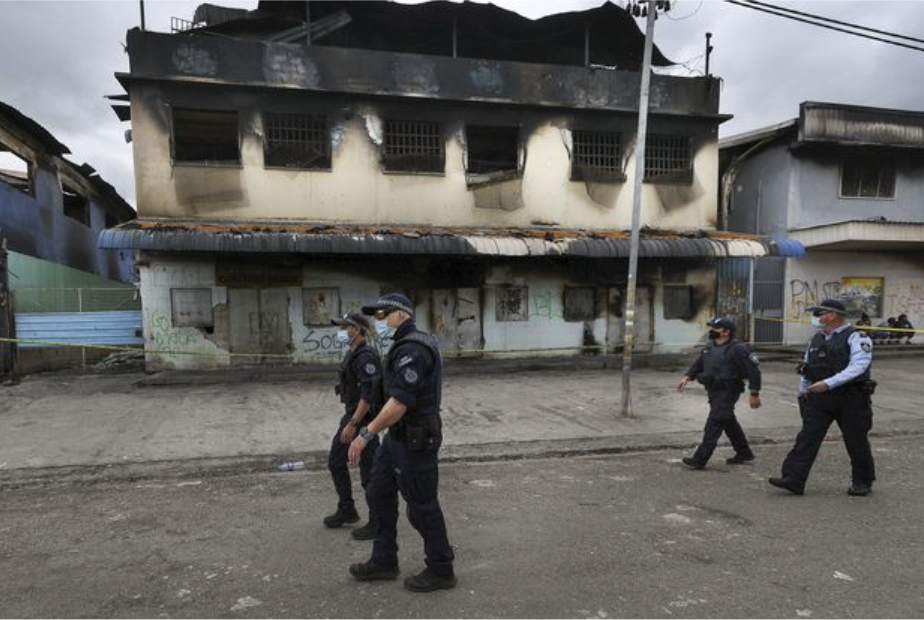Signs of security cooperation between China and the Solomon Islands threatens stability in the entire region
Tensions in the Pacific rose after a leaked security agreement draft between China and the Solomon Islands circulated last week. The agreement signals China’s growing role as a security provider in the region, a development that both Australian and US officials consider threatening.
The draft outlines a broad framework which would allow the deployment of Chinese “police, armed police, military personnel and other law enforcement and armed forces” to the Solomon Islands. A second, and perhaps the more aggressive component of the agreement for Western powers, permits China to make consensual ship visits to the islands and engage in stopovers and transitions.
Prime Minister Sogavare and Chinese Premier Li Keqiang meet in Beijing in 2019. Photo: Thomas Peter / Wall Street Journal
Since 2019, the relationship between the two countries has strengthened, following the Solomon Islands’ switch of diplomatic relations from Taiwan to China. China’s foreign ministry stated that it “highly commends” their decision to cut diplomatic ties with Taiwan. A spokeswoman for the ministry, Hua Chunying, added that “[they] stand ready to work with the Solomon Islands to open new broad prospects for our bilateral relations.”
What was cause for celebration in China was another political loss for Taiwan, which is now only recognized by 16 countries, most of them small nations in Latin America or the Pacific.
The agreement is also not the first case of security cooperation between the two countries. Riots erupted in 2021 on the islands in response to the switch in diplomatic relations and concern among the public for Prime Minister Manasseh Sogavare’s efforts to develop ties with China.
Much of the anger was directed towards Chinese-owned businesses in the capital, Honiara, which stems from sentiments of increased job competition with the influx of Chinese migration. Sogavare’s decision to accept Chinese offers of non-lethal riot equipment and liaison police officers to train its own police force deepened the tensions between the government and the public.
Australian Federal Police sent to Honiara last year during protests. Photo: Gary Ramage / Wall Street Journal
Two leading powers in the region, Australia and New Zealand, have already conveyed their explicit opposition to such an agreement. New Zealand Prime Minister Ardern stated in response to the security pact that, “We see such acts as a potential militarization of the region and also see very little reason in terms of the Pacific security for such a need and such a presence.”
Australia has traditionally played a large role as a security provider in the Pacific, and in September of 2021 it signed the AUKUS agreement with the US and Great Britain, designed to counter Chinese military influence in the Asia-Pacific. The country has also invested heavily in security, law, and justice in the Solomon Islands.
Australian officials have also cited that the draft allows for the potential establishment of a Chinese naval base less than 200 kilometers from the Australian mainland, which would extend military power into the South Pacific and give China the ability to block maritime traffic at its discretion. An Australian lawmaker, James Paterson, emphasized that “this is the strongest evidence you will ever need that the Chinese Communist Party has very expansionist objectives in our region.”
The Pacific is a strategically important region for several reasons, including major shipping lanes, fisheries, and the presence of Western military bases, such as the US base in Guam. The US and its allies do not underestimate the need to preserve strong ties with even small nations like the Solomon Islands, and there is an increased concern that China will utilize its ability to provide economic support to countries in exchange for political clout.
In February, Washington presented its Indo-Pacific strategy, which directly criticized Beijing for leveraging economic, political, and military capabilities to expand its influence. At a summit meeting of counterparts from Australia, India, and Japan, Secretary of State Antony Blinken described the Pacific region as having major consequences for the trajectory of the 21st century. A secured agreement with the Solomon Islands would prove a crucial political win for China and a perceived inability of the US and its allies to limit Beijing’s influence.
Escalating geopolitical tensions in this region are dangerous for all parties involved. Security provision has typically been addressed collectively, most notably through the signing of the Boe Declaration in 2018 by Pacific Island Forum members. Introducing bilateral agreements, experts warn, may threaten this collective approach by showing disregard for the security of the region as a whole.


